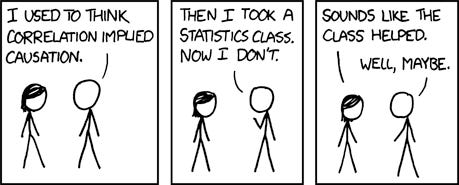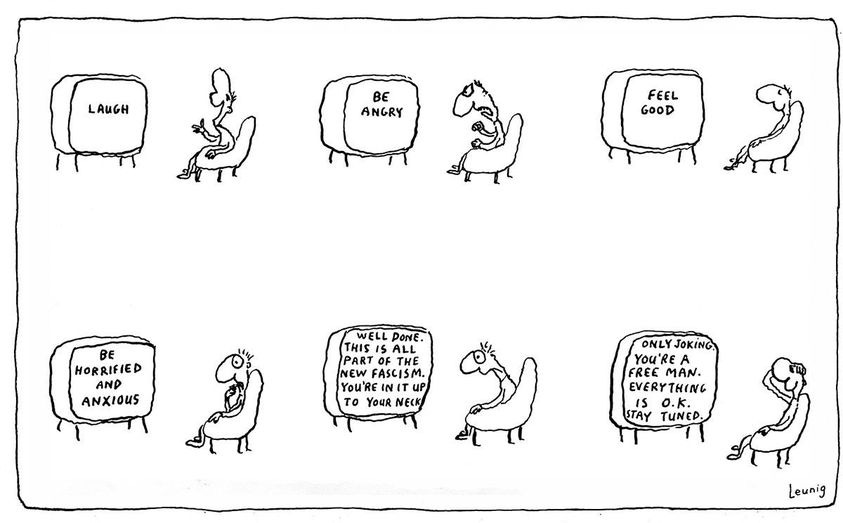No one foresaw the world shortage of respect
Reasonable People #17 investigating the self-fulfilling prophecy of cynicism, with a methodology tutorial subtext
If you only read one thing from this newsletter, please skip to the job adverts and see if you can put them in front of someone who might like the opportunity.
Both victims and executioners
From Kathleen Vohs and team, a new paper which tries to say something fundamental about human nature. It not just an experiment, or even a series of experiments, but almost a whole research programme in microcosm, so it’s worth stepping through part by part and taking time to admire the construction.
Here’s the plan:
"Cynicism is the tendency to believe that people are morally bankrupt and behave treacherously in order to maximize self-interest... we proposed that being the target of disrespect gives rise to cynical views, which predisposes people to further disrespect. "
So the target phenomenon is a dynamic - a vicious cycle of experiencing disrespect, which engenders cynicism, which causes you to disrespect others, and therefore experience more disrespect further down the line. People treated like wolves tend to become wolf-like. How do you try and capture this kind of dynamic as an experimental psychologist?

Image: Alexander and Diogenes by Gaetano Gandolfi (1792)
STUDY 1 of 6 takes survey data from the European Social Survey. It’s not a bad way to start looking at a psychological question - look and see if any data already exists which might be informative. This nationally representative survey covers 29 countries and 53,333 people who answered a host of questions, in amongst which are a few items related to cynicism:
“Generally speaking, would you say that most people can be trusted, or that you can’t be too careful in dealing with people?”,
“Do you think that most people would try to take advantage of you if they got the chance, or would they try to be fair?”,
“Would you say that most of the time people try to be helpful or that they are mostly looking out for themselves?”
…And a few items which assess feelings of disrespect. Participants were asked to indicated “to what extent they feel that people treat them with respect”, for example.
In 28 out of the 29 countries looked at there was a positive correlation between the two measures, and a grand, European, average of r = 0.23. This is a small to moderate correlation, but given the number of other factors which must affect people’s answers it is remarkable to find anything, and definitely suggestive that there’s something to look further into here (the authors note that the positive correlation remains statistically significant when other demographic and economics variables such as ethnicity, income, education, gender and extent of social support are taken into account).
STUDY 2 of 6. Having got the scent of the phenomenon, the next study addresses a big problem with study 1 - it only looked at cynicism and disrespect at one point of time. The phenomenon is question is meant to be a dynamic, something which causes changes over time, so better evidence needs to look at cynicism and disrespect changing over time.
Fortunately the Health and Retirement Study (HRS) provides relevant data. This is another nationally-representative survey, but it is re-polls the participants (Americans over the age of 50). The HRS includes items from a cynical distrust scale, which look like this:
Most people will use somewhat unfair means to gain profit or an advantage rather than lose it
I think most people would lie in order to get ahead
I commonly wonder what hidden reasons another person may have for doing something nice for me
no one cares much what happens to you
most people dislike putting themselves out to help other people
Three items measure perceived disrespect. Participants indicate how often they are:
treated with less courtesy or respect than other people
threatened or harassed
treated as if they are not smart
Using data from 10,516 individuals who did the survey twice, and some statistical magic (‘cross-lagged panel analysis’) the researchers show that being higher in cynicism predicts feeling more disrespect four years later, and the reverse - feeling more disrespect predicts more cynicism four years later.
More evidence that supports their central hypothesis, and all squeezed from existing data. But Stavrova and colleagues obviously attended Methodological Flaws 101 and know that Correlation is Not Causation

Image: XKCD: Correlation
STUDY 3 of 6
An experiment! These are beloved of psychologists because they allow strong causal inference, but notice what we lose by moving into the lab.
The experiment asked participants to recall memories of an interaction with someone else, and then looked at the effect on their cynicism. Half the 232 participants wrote about a time they felt disrespected. The other half, the control condition, wrote about a time they felt guilt due to an interaction with someone else. After this, all participants were asked “Does reliving the experience you wrote about make you think that most people would lie to get ahead?” and “Does reliving the experience you wrote about make you think that it is safer to trust nobody?”
This is the experimental measure of cynicism and showed a clear effect: recalling a time you were disrespected increases your feeling of cynicism compared to recalling a time you felt guilt.
Evidence in favour of half of the proposed dynamic, but Stavrova and colleagues are not content with this result. They know that in moving to an experimental study they have sacrificed realism. In particular the dependent measure directly asked people to connect the experimental intervention with their answer, so maybe the answer was contaminated with something about how the question was asked rather than being a good indicator of feelings of cynicism per se (the authors allude to this concern as ‘common method variance’).
STUDY 4 of 6 tried to test the other half of the proposed dynamic: does cynicism lead to disrespect, as well as address the concern about the measures used.
To do this, the study showed participants a vignette, which existed in two versions (high and a low expressed cynicism versions). Here’s the high cynicism version:
Imagine that you work at a large company. A new colleague – Cory – is joining your department today. You two meet and have a conversation, where you learn that Cory holds a cynical view of human nature. Cory believes that people are selfish; that most of them would lie, cheat, and betray if they could somehow gain by it; and that even when people are helpful, they are still seeking some kind of personal benefit from it
Afterwards, participants were asked to indicate how likely they would be to treat Cory disrespectfully, talk down to Cory, make demeaning remarks about Cory, and so on. The participants were also asked about their own level of cynicism about human nature (indicating their agreement with statements like "It is safer to trust nobody").
The result was a clear effect : when Cory was presented as cynical participants suggested they would be more likely to treat Cory with disrespect. There were also individual differences - the more cynical a participant was, the more likely they were to express the intention to disrespect Cory (regardless of whether they learnt about the cynical or positive versions of Cory).
* * *
Put together, the evidence from the first four studies looks pretty strong, but what I like about this paper is the way it builds the each study on the flaws of the previous study. Too many papers present a single study and try and convince the reader that it is definitive. The reality is that all studies have flaws - even the neatest, most perfectly designed and implemented study has limitations for the simple reason that there is an infinite universe of possible explanations, and the best a single experiment can do is arbitrate between a handful of them. Strong evidence comes from a raft of studies, not single studies (although we like to narrative science as if questions are settled by single studies).
* * *
STUDY 5 of 6 addressed two flaws in study 4. Both the intervention and the measure suffered a lack of realism (‘ecological validity’ as we might call it). The vignette describing Cory’s behaviour confounded cynicism and rudeness (think about it, imagine meeting a new colleague and your first interaction is them offloading about how people can’t be trusted and everybody is just out for themselves. What, no chitchat? No questions?). The major problem though, one that holds for all the prior studies, and probably about 95% of the psychology literature, is that the experiment measured people’s intentions rather than their actual behaviour. The participants were asked to say how they would treat Cory, in their estimation. No good psychologist should take what people say they’ll do at face value.
Study 5 asked participants to play a trust game, for real monetary stakes (the money coming from their payment for participating in the experiment). The game involved the decision to transfer to a partner (or keep) £1. If the participants decided to transferred, the money would be tripled and their partner would decide to keep it all, or could transfer back half (i.e. £1.50). So the participant’s decision can be untrusting and selfish (yielding £1 for them and £0 for their partner) or trusting but risky (yielding either £0 for them and £3 for their partner, or £1.50 for each).
The other key part of the study was that participants were told something about their trading partner's views on human nature. The experimenters did this by taking 100 statements about human nature, from real participants in a prior study, who had also provided ratings on the cynicism-scale. The neat thing about this is it means we have realistic statements (realistic because they are, well, real) and can pair them each with a direct measure of the cynical attitudes of the person who generated them.
The critical outcome is how experimental participants behave towards partners in the trust game, as influenced by these statements expressing their views of human nature. As you’d expect by now, expressed cynicism about human nature made a partner less trusted to ‘invest and return’ in the game. Every standard deviation increase in cynicism increased the probability that a partner would receive no money in the trust game by 150%. It seems like expressing a cynical attitude, by reducing the amount you are trusted, can be costly for everyone (since in this game lack of trust reduces the overall payout, as well as the amount the partner is given).
STUDY 6 of 6 switched methodological gears yet again. Economic games may have real incentives, and measure real behaviour, but they are abstract and perhaps it isn’t obvious how they connect to real life. Study 6 was a diary study, where participants were polled every day for a week on their experiences over the last 24 hours. Using more statistical jiggery-pokery, the researchers then show that elevated expressions of cynicism lead to greater experiences of disrespect in the following time period. Experiencing disrespect, in turn, leads to elevated expressions of cynicism.
* * *
WHAT TO MAKE OF ALL THIS
No study is an island. Despite the claims in individual papers, the quality and quantity of evidence across multiple studies is what tips the scientific scales. This weighing of evidence can be obscured if you focus on the flaws in individual studies - it isn’t clear if a flaw is common to all studies on a topic, or is actually accounted for and covered by other studies. Not only does Stavrova, Ehlebracht & Vohs (2020) present a series of studies, but they are forthright about the limitations in each study which prompted the next in the chain, and the studies themselves come at the central claim from a variety of angles. This is methodological triangulation, aka ‘converging operations’ in cognitive psychology, and should be the goal of any research programme as it matures - not just to show an experimental effect, but to show that the underlying phenomenon can be elicited in a variety of ways. So, methodologically, this paper is really rich and a nice example of the evolution of evidence across multiple studies.
Conceptually though, there’s no point in methodological sophistication if your research question is uninteresting. Are we surprised that cynicism engenders disrespect? Is this the most important question we could ask on this topic? The fact that the world hasn’t completely collapsed into universal cynicism and disarray suggests that there must be counter forces to this dynamic. Perhaps the more important research programme is to work out what engenders trust, rather than cynicism (the way the authors use cynicism it seems pretty clear it is the reverse of a generalised trust, or social capital, as it is talked about in other areas).
I started looking at the paper because I was interested in hard evidence that what we think of each other matters. There’s no shortage of expressed cynicism in the world today, and it seems an easy position to adopt. Evidence of the meanness of human nature is abundant, and there also seems to be an asymmetry where evidence of human baseness is often more salient or concrete than evidence of human kindness. These studies suggest there’s a real risk that over-weighting this evidence can create a self-fulfilling prophecy, where we deny ourselves the chance to interact with others in a non-cynical way, a way that generates evidence of human trustworthiness. As long there is unwarranted cynicism, research like this is a necessary warning that lack of trust has its costs too; that there can be foolish trustlessness as well as foolish trust.
Reference:
Stavrova, O., Ehlebracht, D., & Vohs, K. (2020, January 22). Victims, Perpetrators, or Both? The Vicious Cycle of Disrespect and Cynical Beliefs about Human Nature. In press at Journal of Experimental Psychology: General.
Online materials. Open Science brownie points: open access preprint available, preregistered predictions, open data, materials and analysis code. Some propriety data/code formats, and not all stimulus materials included, but still pretty righteous.
Ad break: if you know someone who might enjoy this newsletter, please forward it on to them, or share with the button below.
JOB! Engaging Dialogue Generated From Argument Maps
I’m hiring - please pass on this link to interested parties
Applications close 3rd October. Here’s the project abstract:
The idea is to design a “dialogue system” interface to existing databases of the arguments surrounding controversial topics such as “Should the United Kingdom remain a member of the European Union?” or “Should all humans be vegan?”. In particular, a user can have a “Moral Maze” style chat with the dialogue system.
“Moral Maze” is a longrunning popular BBC 4 Radio programme in which a panel discusses a controversial topic with the help of witnesses and a host who chairs the conversation. The dialogue system consists of a panel of Argumentation Bots (ArguBots) who present arguments for or against the topic under discussion (the pro and con ArguBots), a host ArguBot and a witness ArguBot (that can provide detailed evidence). The user is invited to join the panel and voice their views on the topic under discussion. Thus the user can explore what they thought and what others thought about the controversial topic.
An important part of the projects will be to evaluate the effects on people’s appreciation of the complexity of debate and attendant ability to comprehend the world from other people’s point of view or perspective.
More here: Engaging Dialogue Generated From Argument Maps
ANOTHER JOB! Understanding online political advertising: perceptions, uses and regulation’
This one on our project ‘Understanding online political advertising: perceptions, uses and regulation’, seeking someone with a Computer Science/NLP background to work with Niko:


Applications close 9th of October. The project is led by Kate Dommett, who’ll be advertising for a postdoc with more of a political science background soon. Watch this space.
AN APOLOGY
In the email version of my last newsletter (RP#16 Democratic Reason) I persistently misspelt Hélène Landemore’s name (missing out the first ‘e’ in Landemore). I’ve corrected this in the online version after she politely pointed this out, but the shame still burns. Readers of this newsletter must surely have growing affection for my chronic typo-habit, but I really have no excuse on this one. Hélène’s book was right in front of me. I think I must have unconsciously tried to anglicise her surname by missing out the ‘e’, or something. Sorry readers, Sorry Hélène. Onwards!
Read: Democratic Reason: Politics, collective intelligence, and the rule of the many by Hélène Landemore
PAPER: Reducing implicit racial preferences: III. A process-level examination of changes in implicit preferences
While we’re on the topic of good science, this is an impressive effort from Jimmy Calanchini, Calvin Lai, Karl Christoph Klauer
Abstract:
Implicit bias change was initially assumed to reflect changes in associations, but subsequent research demonstrated that implicit bias change can also reflect changes in control-oriented processes that constrain the expression of associations. The present research examines the process-level effects of 17 different implicit bias-reduction interventions and one sham intervention by analyzing data from more than 20,000 participants who completed an intervention condition or a baseline control condition followed by a race Implicit Association Test (IAT). To identify the processes influenced by each intervention, we applied the Quadruple process model to participants' IAT responses then meta-analyzed parameter estimates according to a taxonomy of interventions based on shared features. Interventions that relied on counterstereotypic exemplars or strategies to override biases influenced both associations and control-oriented processes, whereas interventions that relied on evaluative conditioning influenced only control-oriented processes. In contrast, interventions that focused on egalitarian values, perspective taking, or emotion had no reliable influence on any of the processes examined. When interventions did change associations, they were much more likely to reduce positive White associations than negative Black associations. The present research extends upon traditional dual-process perspectives by identifying robust intervention effects on response biases. These findings connect features of interventions with changes in the processes underlying implicit bias.
What I like isn’t just the high participant number, but the attempt to probe the cognitive-mechanistic underpinnings of the phenomenon. This is how psychology reaches the parts other disciplines cannot reach - it tries to find out why, in terms of mental processes, things happen and thus allow generalisation to situations that are require similar mental processes.
Calanchini J, Lai CK, Klauer KC. Reducing implicit racial preferences: III. A process-level examination of changes in implicit preferences [published online ahead of print, 2020 Aug 27]. J Pers Soc Psychol. 2020;10.1037/pspi0000339. doi:10.1037/pspi0000339. (pre-print)
PAPER: National identity predicts public health support during a global pandemic
Abstract:
The ongoing COVID-19 pandemic is a devastating global health crisis. Without a vaccine or effective medication, the best hope for mitigating virus transmission is collective behavior change and support for public health interventions (e.g., physical distancing, physical hygiene, and endorsement of health policies). In a large-scale international collaboration (N = 46,450 across 67 countries), we investigated why people adopted public health behaviors and endorsed public policy interventions (e.g., closing bars and restaurants) during the early stages of the pandemic (April-May, 2020). Results revealed that respondents who identified more strongly with their nation consistently reported engagement in public health behaviors and greater support for public health policies. We also found a small effect of political orientation, indicating that left-wing respondents were more likely to report public health behaviors and support for public health measures than right-wing respondents. We discuss the implications of links between national identity, leadership, and public health for managing the COVID-19 pandemic and future pandemics.
Which I tend to see in the context of the idea that people are always motivated by far more than brute self-interest and force. Whatever you may think of nationalism (“an infantile disease, the measles of mankind”, anyone?) it is an idea. This research shows that in a concrete way its motivating force on a individual behaviour, across a global stage.
Van Bavel, J. J., Cichocka, A., Capraro, V., Sjåstad, H., Nezlek, J. B., Alfano, M., … TYRALA, M. (2020, September 2). National identity predicts public health support during a global pandemic. https://doi.org/10.31234/osf.io/ydt95
BOOK: Strategic Instincts: The Adaptive Advantages of Cognitive Biases in International Politics by Dominic D. P. Johnson
Not read it, but here’s the start of the blurb:
A widespread assumption in political science and international relations is that cognitive biases—quirks of the brain we all share as human beings—are detrimental and responsible for policy failures, disasters, and wars. In Strategic Instincts, Dominic Johnson challenges this assumption, explaining that these nonrational behaviors can actually support favorable results in international politics and contribute to political and strategic success. By studying past examples, he considers the ways that cognitive biases act as “strategic instincts,” lending a competitive edge in policy decisions, especially under conditions of unpredictability and imperfect information.
Princeton University Press: Strategic Instincts: The Adaptive Advantages of Cognitive Biases in International Politics
Twitter: @DomDPJohnson
NEWSLETTER: The Ruffian by Ian Leslie
I’ve probably recommended it before, but I’m going to recommend it again just for this review of Rational Ritual, by Michael Suk-Young Chwe, a book about why successful human society depends on everyone knowing something about what everyone knows.
And Finally…

From Michael Leunig, via Michael Leunig Appreciation Page of fb



